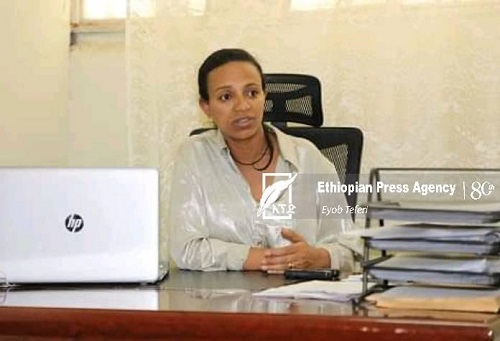
Abay Garment Factory located in Gondar, Amhara State is a manufacturing industry engaged in the garment and textile sector under the Abay Industry Development Share Company that was established by more than 250 shareholders and over 400 million Birr capital.
The company embraces various projects including the Abay Garment Factory, Dejen Cement Factory, Bahir Dar Steel Factory and MDF factories in various cities of the State.
Abaynesh Tessema, Manager of Abay Garment Factory said that the factory was become operational on October 2019. At the time, the factory could hire less than 100 employees. It started the operation through giving training to the workers by coaches came from abroad with proficient knowledge and experience in the garment and textile sector. In fact, the training is not interrupted yet in spite of some changes in the training mechanisms and focus areas.
These days, the factory embraced about 800 workers in which 95 percent of them are females. Such labor intensive careers need mostly the involvement of female workers. Especially the garment and textile industry needs them utmost for their conscious and quality skills and gift including even finger flexibility. They are the best option for their enduring efforts in producing quality works with patience.
The factory has three phases. The first phase is the current stage in which it is making clothes from local and imported fabrics. In the second phase, it will produce textile products that will serve as an input for dressmaking. Finalizing the water treatment plant is also part of this phase.
The third phase will incorporate cultivating land and producing cotton in the surrounding areas including Metema and Humera to feed the factory with own sufficient raw material since cotton cultivation is very aspiring for the conducive agricultural potential. “So, our plan is to produce quality clothes through the three value chains,” Abaynesh said.
The factory is working tirelessly to own three shades that will create over 3000 jobs when it gets fully operational. However, despite this ambitious plan, the factory’s operation is limited from achieving the phases as scheduled due to coronavirus pandemic.
As a result, the factory is distributing its all products in the country although it has planned to export 80 percent of its products to Europe and US and to substitute importing products with the rest 20 percent.
Coronavirus pandemic appeared as a great challenge as it happened at the time when the factory was promoting its products to penetrate the market. It has affected the sale of some 30 million birr worth products.
Therefore, the factory is obliged to store its products in a warehouse. “Therefore, we had zero level sell and all the products are stocked. The pandemic was happened when
we were promoting the initial products that were produced in the first phase of the factory. Accordingly, the relation with our international partners has been interrupted. Therefore, our factory’s major goal was exerting an effort to withstand the pandemic without reducing any worker,” the manager said.
At the time when the whole world is panic on the pandemic, the factory was working to change the problem into an opportunity as bless in disguise. To this end, the factory is working in collaboration with the Ministry of Trade and Industry to get assistance that enables shift its products to face masks.
Therefore, it has produced three to four million face masks and dispatched them for free to public servants that might have high exposure to the pandemic including workers of public health, road transport, traffic polices and security staffs. The factory also distributed over one million masks to universities. Besides, it has provided the rest mask products to the local market with fair price of eight birr per piece at the time when market price of a single mask was around 40 Birr.
“We hope the current revival of our customers will grow rapidly in a short period of time as the psychological impact of the pandemic is decreasing as it is no more new to the public,”Abaynesh noted. The factory has planned to supply the stored product in various exhibitions and through various shops aiming to regain its potential and get back to its previous position by resisting the pandemic.
The factory produces 100 percent cotton products including shirts, T-shirts, pants, and tight trousers for children as well. “We are producing items with quality, standards and styles that the international customers are asking for. On the other hand, we also work on augmenting Ethiopia’s garment industry products to the world so that the global market will be attracted by our country’s products,” she said.
Abaynesh further elucidated that the factory is utilizing high-tech 2019 model machines that are helpful to produce quality garment and textile products based on the needed standard. In addition, most of the workers are graduated from Bahir Dar University and TVETs so that they are capable in operating the modern machineries.
As a result, the company is blessed with both skilled manpower and the state-of-the-art technologies to produce quality products that in turn enable it to penetrate the global market. Doing so, the company will be competing to produce internationally fit brands or penetrate the market with its own brand.
The factory is working to begin exporting its products in 2022. To this end, it is finalizing compliance audits, and some machine installation. Focusing on export-oriented market is mainly to curb country’s forex crunch and importing its own inputs.
However, despite to the factory’s persistent effort to resist the pandemic, Abaynesh said that the factory is facing forex shortage to import inputs. By the same token, shortage of water and repeated power breakdown is common in the area the factory is settled. Currently it is utilizing ground water and generators as a short term solution. Hence, she called on the government to find the long term solution.
BY YOHANES JEMANEH
The Ethiopian Herald April 28/2021





